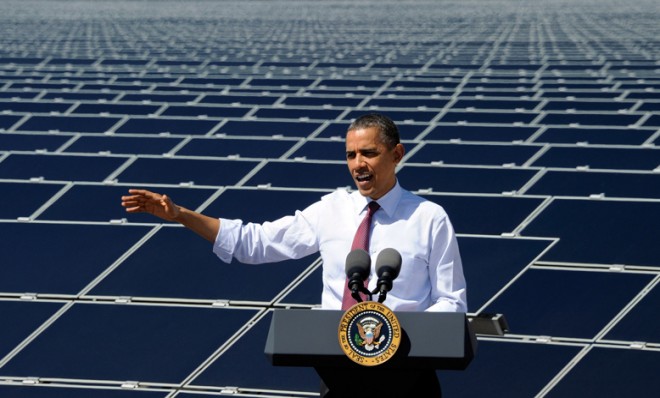Do artificial fossil fuels have a future?
A new technology lets researchers create synthetic energy by stripping carbon dioxide from the air

A free daily email with the biggest news stories of the day – and the best features from TheWeek.com
You are now subscribed
Your newsletter sign-up was successful
The processes that create fossil fuels are complex, and take place over extremely long periods of time.
The oil and gas we use today began as plants and animals living millions of years ago. When the living things died, layers of sediment buried their bodies over millions of years, pushing large quantities of the organic material deeper into the Earth. At deeper depths, over thousands and thousands more years, greater levels of heat and pressure transformed the organic materials into fossil fuels.
That's how fossil fuels— which account for 85 percent of the world's energy use — were formed. If we use up the total quantity of extractable fossil fuels that are still in the ground — something that could happen in the next 100 years — we would have to wait millions of years for new deposits to form.
The Week
Escape your echo chamber. Get the facts behind the news, plus analysis from multiple perspectives.

Sign up for The Week's Free Newsletters
From our morning news briefing to a weekly Good News Newsletter, get the best of The Week delivered directly to your inbox.
From our morning news briefing to a weekly Good News Newsletter, get the best of The Week delivered directly to your inbox.
That means that sooner or later we will have to transition to alternative energy — nuclear, solar, wind, hydroelectric, etc.— a shift which to some degree is already occurring. In the first quarter of 2013, 49 percent of new U.S. electricity capacity was from photovoltaic solar. This will only accelerate as alternative energy technology is refined, and as scarce fossil fuels are used up.
But fossil fuels are still convenient. The vast majority of our energy infrastructure was created for their use, so there remains a demand for ways to keep using them.
Enter synthetic fossil fuels, which many scientists are working to develop. In 2010, biofuels company Joule Unlimited patented "a genetically altered bacterium that converts sunlight and carbon dioxide into ingredients of diesel fuel," according to The New York Times. And in 2012, a team of scientists working at Princeton concluded that "the United States could eliminate the need for crude oil by using a combination of coal, natural gas and non-food crops to make synthetic fuel."
But are synthetic fossil fuels really a good choice for future energy capacity? We know that in the last 100 years carbon dioxide levels have risen from around 280 ppm to over 399 ppm, while global temperatures have risen by 0.8°C. There is a scientific consensus that human activity is responsible for most or all of this rise.
A free daily email with the biggest news stories of the day – and the best features from TheWeek.com
Current estimates suggest that climate change is very likely to become dangerous to human civilization above 550 ppm, but less likely below 450 ppm. Continuing to burn synthetic fossil fuels will continue to raise the level of carbon dioxide and other greenhouse gases in the atmosphere, potentially triggering dangerous or catastrophic climate change. Unless we can find a way to otherwise reduce the levels of carbon dioxide in the atmosphere, synthetic fossil fuels would seem to be a dangerous choice.
One option is to create fuels that work similarly to fossil fuels but that when burned don't emit any carbon dioxide. British scientists are working on a cheap hydrogen-based synthetic gasoline that costs $1.50 a gallon to manufacture, doesn't emit carbon dioxide, and can be used in existing vehicles without engines modifications.
But even if zero-carbon fuels don't reach the marketplace, the very production of synthetic fossil fuels may itself be a way to reduce the level of carbon dioxide in the atmosphere. In 2012, a company called Air Fuel Synthesis announced the discovery of a new technology that can create synthetic fossil fuels by stripping carbon dioxide out of the air. This kills two birds with one stone, allowing us to reduce and limit levels of atmospheric carbon dioxide while simultaneously producing fuels. Similarly, Columbia University geophysicist Klaus Lackner has developed a portable carbon scrubber that can remove to a ton of carbon dioxide from the atmosphere in a day to either be sequestered underground, turned into plastics, or turned into fuel.
Although stripping carbon dioxide out of the atmosphere cannot address other climate problems like ocean acidification or methane emissions, and although the cost remains high, the technology already exists to regulate the level of carbon dioxide in the atmosphere.
This suggests that artificial fossil fuels may have a strong future — especially if their production reduces, rather than increases, atmospheric carbon dioxide levels.
Editor's note: This article has been revised since it was first published in order to more clearly include proper attribution to source material.
John Aziz is the economics and business correspondent at TheWeek.com. He is also an associate editor at Pieria.co.uk. Previously his work has appeared on Business Insider, Zero Hedge, and Noahpinion.
-
 Hong Kong jails democracy advocate Jimmy Lai
Hong Kong jails democracy advocate Jimmy LaiSpeed Read The former media tycoon was sentenced to 20 years in prison
-
 Japan’s Takaichi cements power with snap election win
Japan’s Takaichi cements power with snap election winSpeed Read President Donald Trump congratulated the conservative prime minister
-
 Seahawks trounce Patriots in Super Bowl LX
Seahawks trounce Patriots in Super Bowl LXSpeed Read The Seattle Seahawks won their second Super Bowl against the New England Patriots